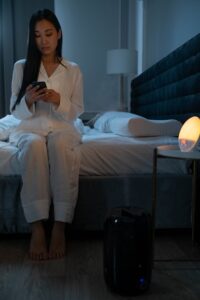 If you suffer from obstructive sleep apnea (OSA), a good night’s rest can be difficult. Frequent breathing disruptions deplete your body of oxygen and interrupt your sleep cycle. Poor sleep quality can cause daily fatigue, irritability, and anxiety. Not to mention, untreated sleep apnea is connected to potentially life-threatening complications, like heart disease, diabetes, and sleep deprivation. Worrying about breathing disruptions or poor sleep can cause anxiety levels to rise, which can make it difficult to fall asleep. However, your cell phone could also make you toss and turn at night. Here’s why you should shut off your cell phone before heading to bed.
If you suffer from obstructive sleep apnea (OSA), a good night’s rest can be difficult. Frequent breathing disruptions deplete your body of oxygen and interrupt your sleep cycle. Poor sleep quality can cause daily fatigue, irritability, and anxiety. Not to mention, untreated sleep apnea is connected to potentially life-threatening complications, like heart disease, diabetes, and sleep deprivation. Worrying about breathing disruptions or poor sleep can cause anxiety levels to rise, which can make it difficult to fall asleep. However, your cell phone could also make you toss and turn at night. Here’s why you should shut off your cell phone before heading to bed.
Electronic Devices and Sleep Quality
Your body’s circadian rhythm is your “internal clock,” which is very sensitive to the blue light emitted from electronic devices, like cell phones, tablets, and TV screens. The blue color is interpreted by your brain as the color of the sky, which means it is time to wake up! If your body thinks it is earlier in the day, it won’t release melatonin, the hormone responsible for regulating sleep. As a result, you won’t feel tired until much later in the night after you’ve turned off any screens.
Sleep apnea sufferers struggle to get sufficient sleep from regular pauses in breathing. When combined with falling asleep later, sleep deprivation can occur quickly, which can cause depression, loss of cognitive abilities, memory loss, and various health problems, like cardiovascular disease.
How to Get a Good Night’s Rest
Healthcare professionals and sleep apnea specialists recommend turning off screens at least an hour before bedtime. Instead, find a relaxing activity, like reading a book or yoga. You can even take a brisk 30-minute walk, which can promote sleep quality and reduce OSA symptoms.
Keep your bedroom at a comfortable temperature and lower the lighting to promote a great sleep environment. Besides changing your bedtime routine, get treatment for your sleep apnea. You have multiple options to breathe better, like:
- CPAP: A CPAP machine is the most traditional treatment for sleep apnea. Gentle air pressure is delivered through a mask worn over your mouth or nose to prevent breathing disruptions.
- Oral Appliance: An oral appliance can be used alone or along with a CPAP. The custom-fit appliance moves the jaw and tongue into a more comfortable position to keep the airway open.
Don’t let poor sleep quality harm your wellness. With the right changes at home, like turning off your cell phone and sleep apnea therapy, you can get the rest you need to feel your best.
About Dr. Jay A. Nelson
Dr. Nelson is a diplomate of the American Board of Dental Sleep Medicine, the American Academy of Craniofacial Dental Sleep Medicine, and many other professional organizations. He specializes in sleep apnea and snoring treatment using effective solutions, like oral appliances. Request an appointment through his website or call his office at (813) 694-1580.
